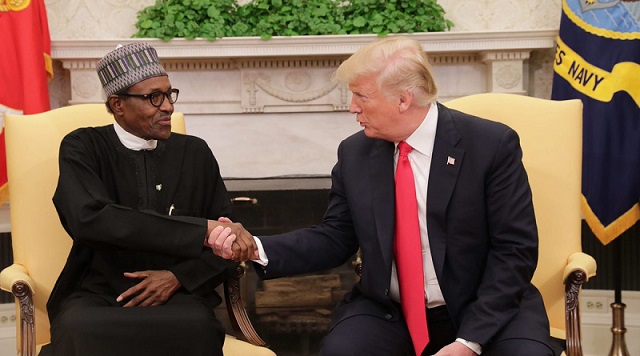
Abuja, Nigeria | AFP | Muhammadu Buhari swept to power on a wave of optimism in 2015, becoming the first opposition candidate in Nigerian history to defeat a sitting president.
The candidate who promised change now wants a second term of office and has vowed to double down on his anti-corruption crusade, improve security and diversify the economy.
But as his first four years come to an end, his approval rating has plummeted to 41 percent in May from a peak of 80 percent in October 2015, according to NOI Polls.
There have also been concerns about his fragile health, his economic policies, the extent of his claims about better security, as well as the targets of his campaign against graft.
Before winning in 2015, the 75-year-old former army general and self-styled “converted democrat” had tried three times to become president since Nigeria’s return to democracy in 1999.
Born in Daura, in the northern state of Katsina, Buhari was Nigeria’s military ruler from December 1983 to August 1985 after he ousted elected president Shehu Shagari.
Back then, critics of his regime were thrown in jail, among them the Afrobeat legend Fela Kuti for an alleged currency violation that critics said was politically motivated.
– Autocratic legacy? –
Last year, Buhari spent six months receiving treatment for an undisclosed illness as Nigeria stumbled out of a recession and violence spiked across the country.
Dubbed “Baba Go Slow” for taking six months to appoint cabinet ministers, Buhari — presented by his office as a virtual ascetic uninterested in personal wealth — has been attacked for his unorthodox economic policies.
His government’s decision to peg the naira currency at an artificially high rate worsened a foreign exchange shortage that continues to drain external reserves.
Foreign investors — already rattled by the lack of forex and the effects of the recession — are also wary after South African telecoms giant MTN was slapped with a $10 billion bill in back-taxes.
Working to diversify Nigeria’s economy away from oil, Buhari prioritised the agricultural sector as a way to boost growth.
But the hard work has been hampered by escalating clashes between nomadic herders and sedentary farmers across the country’s agricultural heartland.
In early October, the World Bank cut its growth rate forecast for Nigeria this year by 0.2 percentage points to 1.9 per cent.
On anti-corruption, Buhari’s zeal for recovering stolen public funds and bringing those responsible to justice has been widely praised.
But political opponents have labelled it a witch-hunt.
For some critics, Buhari’s leadership style has too closely mirrored his time as the no-nonsense head of a military government whose methods incurred the wrath of rights groups.
Then, he ordered whip-wielding soldiers to enforce neat queues at chaotic bus stops and tardy public servants to do humiliating frog jumps.
– Unfinished business –
In the early months of his presidency, Buhari detained three high-profile opponents without charge, justifying in his first — and only — media chat that they had committed “atrocities” against the government.
The opposition has accused him of turning the presidency into a regional dynasty, with an impenetrable “cabal” of close advisors in control of affairs at the expense of national unity.
Buhari has had better success at taming rampaging Boko Haram insurgents, which during the previous administration controlled swathes of territory in the country’s northeast.
Under Buhari, the jihadists were pushed out of their strongholds in the three northeastern states of Yobe, Borno and Adamawa.
Similarly, he has brought home 107 of the 219 schoolgirls kidnapped from in Chibok that brought world attention on the conflict and contributed to his predecessor’s downfall.
But nine years into their war against the Nigerian government, the Islamists still pose a threat to the region and launch regular bloody attacks on troops and civilians.
Since taking office, Buhari has been seen to be a man of few words, preferring his more outgoing Vice-President Yemi Osinbajo to be the public face of the government.
But in one of his few public speeches, on Nigeria’s independence day on October 1 this year, Buhari warned against “quick fixes or short cuts” to the nation’s problems.
“We know we are on the right path,” he said. “Our journey is not finished but we have come a long way.”
It will be up to Nigerians in February next to decide if they want to give him more time.
 The Independent Uganda: You get the Truth we Pay the Price
The Independent Uganda: You get the Truth we Pay the Price



